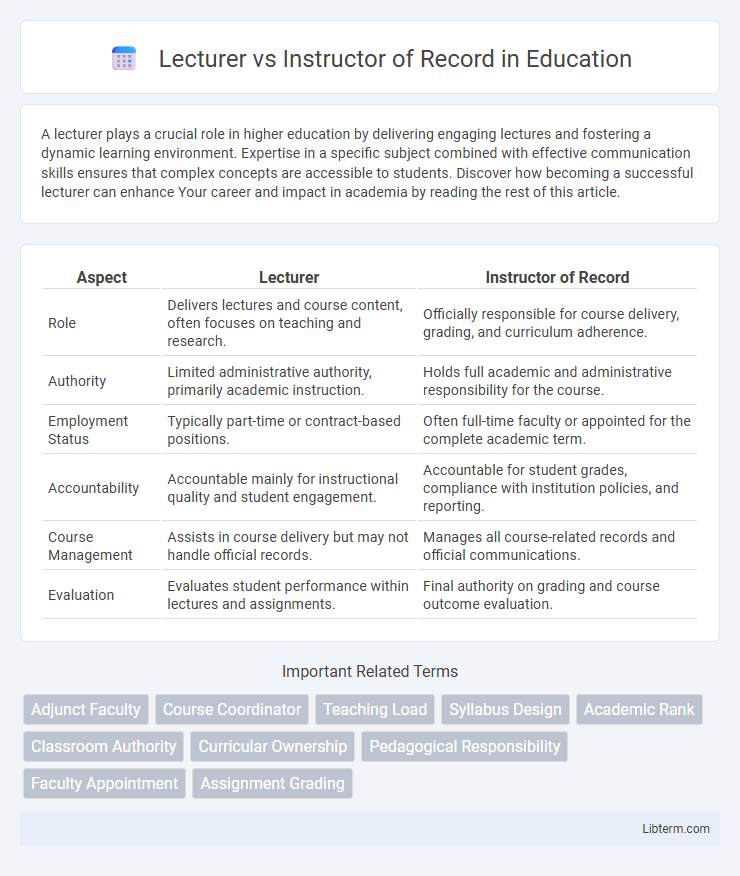A lecturer plays a crucial role in higher education by delivering engaging lectures and fostering a dynamic learning environment. Expertise in a specific subject combined with effective communication skills ensures that complex concepts are accessible to students. Discover how becoming a successful lecturer can enhance Your career and impact in academia by reading the rest of this article.
Table of Comparison
| Aspect | Lecturer | Instructor of Record |
|---|---|---|
| Role | Delivers lectures and course content, often focuses on teaching and research. | Officially responsible for course delivery, grading, and curriculum adherence. |
| Authority | Limited administrative authority, primarily academic instruction. | Holds full academic and administrative responsibility for the course. |
| Employment Status | Typically part-time or contract-based positions. | Often full-time faculty or appointed for the complete academic term. |
| Accountability | Accountable mainly for instructional quality and student engagement. | Accountable for student grades, compliance with institution policies, and reporting. |
| Course Management | Assists in course delivery but may not handle official records. | Manages all course-related records and official communications. |
| Evaluation | Evaluates student performance within lectures and assignments. | Final authority on grading and course outcome evaluation. |
Introduction: Defining Lecturer and Instructor of Record
A Lecturer is typically a faculty member who delivers course content without bearing full responsibility for the course's administrative and grading duties. An Instructor of Record holds official accountability for course management, assessment, and adherence to academic standards. These roles differ in their scope of authority and institutional recognition within educational settings.
Key Responsibilities and Roles
Lecturers primarily focus on delivering course content, designing syllabi, and assessing student performance with emphasis on teaching excellence and curriculum development. Instructors of Record hold full accountability for the academic integrity of the course, including grading policies, compliance with institutional standards, and final grade submissions. Both roles require strong communication skills and subject expertise, but Instructors of Record carry additional administrative and evaluative responsibilities.
Educational Qualifications Required
A Lecturer typically requires an advanced degree such as a master's or doctorate, often with specialized expertise in their academic field to design and deliver course content. An Instructor of Record may hold a bachelor's degree but is expected to demonstrate practical experience and proficiency in course instruction, sometimes fulfilling roles in institutions with less emphasis on research qualifications. Both positions demand subject matter knowledge, but the Lecturer role prioritizes higher academic credentials aligned with teaching and scholarly expectations.
Authority in Course Design and Grading
The Instructor of Record holds primary authority over course design, content, and grading policies, ensuring alignment with academic standards and institutional requirements. Lecturers often deliver course material but may have limited or no decision-making power regarding curriculum development and final grade assignments. This distinction impacts accountability, with the Instructor of Record responsible for assessing student performance and maintaining academic integrity.
Interaction with Students
Lecturers typically engage with students through lectures, group discussions, and office hours, fostering a dynamic learning environment with direct feedback and personalized guidance. Instructors of record often manage course logistics, assessments, and grading, facilitating student interactions primarily through structured academic responsibilities and formal communication channels. Both roles require clear, consistent communication to support student learning outcomes and academic success.
Employment Status and Contract Types
Lecturers typically hold full-time or part-time employment with renewable annual contracts that emphasize teaching responsibilities without tenure eligibility. Instructors of Record often occupy adjunct or part-time positions with short-term contracts focused on course delivery and limited institutional duties. Employment status for Lecturers is generally more stable with access to benefits, whereas Instructors of Record usually have contingent roles with less job security.
Career Advancement Opportunities
Lecturers often have limited career advancement opportunities compared to Instructors of Record, who typically hold tenure-track positions with clearer pathways to promotion and higher academic ranks. Instructors of Record usually have responsibilities tied to curriculum development and student evaluation, positioning them for roles like Assistant Professor or Department Chair. The Lecturer role is frequently contract-based with less institutional support for long-term career growth or research opportunities.
Differences Across Academic Institutions
Lecturer and Instructor of Record roles differ significantly across academic institutions, with lecturers often holding non-tenure track positions focused on teaching and curriculum development, while Instructors of Record may carry full responsibility for course delivery and grading without research obligations. Variations occur in rank, job security, and faculty status, where some universities classify lecturers as contingent faculty, whereas Instructors of Record might have more formal recognition and defined roles in academic governance. Institutional policies and regional standards heavily influence these distinctions, impacting workload expectations, contract duration, and career advancement opportunities.
Impact on Student Learning Outcomes
Lecturers often bring specialized expertise and research backgrounds that can enhance course content relevance, positively impacting student learning outcomes through updated knowledge. Instructors of Record typically hold formal responsibility for course design and assessment, ensuring alignment with academic standards that promote consistent and measurable student achievement. Both roles influence learning success, but the Instructor of Record's oversight of grading and curriculum execution directly affects students' academic progress and outcome reliability.
Choosing Between Lecturer and Instructor of Record
Choosing between a Lecturer and an Instructor of Record depends on the specific academic responsibilities and institutional policies. Lecturers typically focus on delivering course content without bearing full administrative duties, whereas Instructors of Record hold primary accountability for course design, grading, and compliance with academic standards. Institutions prioritize the Instructor of Record role for leadership in curriculum development and student outcomes assessment.
Lecturer Infographic

 libterm.com
libterm.com